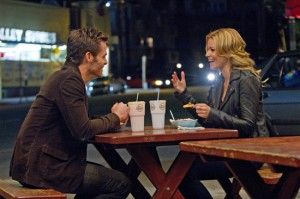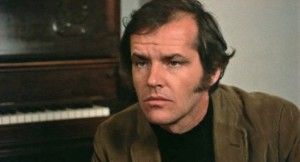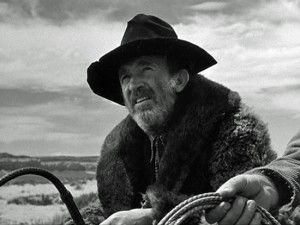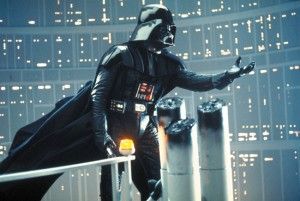Father’s Day Roundup of Six Dads You Want to Avoid
Here are some films that give parenthood a bad name
/https://tf-cmsv2-smithsonianmag-media.s3.amazonaws.com/filer/20120615020049There_Will-thumb.jpg)
In honor of Father’s Day, you could watch some of the noble parents who have appeared in film over the years. Perhaps the heroic lawyer Atticus Finch, played by Gregory Peck in To Kill a Mockingbird (1962). Or the benignly cranky Spencer Tracy in Father of the Bride (1950), remade with Steve Martin in 1991. Maybe Life With Father, filmed in 1947 with William Powell as the dyspeptic but loving stockbroker Clarence Day. Or even A Tree Grows in Brooklyn (1945), which won James Dunn an Oscar as the suicidal Johnny Nolan.
Or maybe you find the whole idea of Father’s Day—generally believed to have been invented by Sonora Smart Dodd in 1910, but popularized by merchants like the Associated Men’s Wear Retailers in the 1930s—just another a moneymaking ploy. If that’s the case, a less-than-stellar Dad might be more entertaining.

Movies and television are filled with bumbling, inept dads, like the henpecked Harold Bissonette W.C. Fields played in It’s a Gift (1934), or Arthur Lake as Dagwood in his long series of “Blondie” movies, or our reigning champion, Homer Simpson. Adam Sandler, who already starred in Big Daddy, takes the lead in That’s My Boy, released today to cash in on Father’s Day.
But a darker strain of stories stretching back to the Greeks shows fathers in a different light. More recently, Eugene O’Neill had an ambivalent relationship with his father, the actor James O’Neill, while Tennessee Williams presented a monstrous Big Daddy in Cat on a Hot Tin Roof. Weak or downright bad fathers abound in the works of Dickens and Faulkner, and in their film adaptations. Alfred Hitchcock’s father once had him locked as a child in a jail cell, an experience that colored many of the director’s subsequent films.
Here are some more bad movie fathers:

1. People Like Us (2012). In Alex Kurtzman’s film, loosely based on real events, hot-shot salesman Sam Harper (played by Chris Pine) has been estranged from his father Jerry for years. When Jerry, a former record producer, dies, the deep-in-debt Sam expects a helpful settlement. Instead, he learns that Jerry had a separate family, and that his stepsister Frankie (Elizabeth Banks), a single mom and recovering addict, is getting the money he needs. Both siblings have bad memories of their father, which may explain why they are in such terrible shape as the film begins.
2. The Kid With the Bike (2011). Directed by Jean-Pierre and Luc Dardenne, this small-scale movie focuses on Cyril (played by Thomas Doret), an eleven-year-old living in an orphanage in Belgium. Cyril keeps trying to contact his father Guy (Jérémie Renier), unwilling to accept that he has been abandoned. Few scenes are as cold and heartless as one in which Cyril finally confronts Guy in a restaurant. As an actor, Renier gives an admirably detached performance that adds to the film’s poignancy.

3. Five Easy Pieces (1970). A countercultural touchstone, Bob Rafelson’s film shows why classical pianist Bobby Dupea (Jack Nicholson) ends up a working in an oil field: it’s Dad’s fault. A scene in which Nicholson battled a diner waitress over a chicken salad sandwich helped make him a superstar, but the film inexorably circles back to his crippling relationship with his father. Nicholson, who told one reporter that he does not know who his biological father is, encountered another fearsome parent in Roman Polanski’s Chinatown.

4. My Darling Clementine (1946). John Ford’s great Western is ostensibly about Wyatt Earp, Doc Holiday, and the Gunfight at O.K. Corral, but once you see the film you will never forget Walter Brennan as Ike Clanton, a villain for the ages. Whether rustling cattle, whipping his sons for failing him or shooting a rival in the back with a shotgun, Brennan’s Clanton is a father to be feared and obeyed. Brennan plays him perfectly, without a shred of decency or honesty.
5. There Will Be Blood (2007). Playwright Rob Potter reminded me of this 2007 film by Paul Thomas Anderson. Daniel Day-Lewis won an Oscar as Daniel Plainview, a prospector who cheats and murders his way to oil wealth, with Dillon Freasier as his hapless son. Potter cites this dialogue from Plainview: “Drainage! Drainage, Eli! Drained dry, you boy! If you have a milkshake and I have a milkshake and I have a straw and my straw reaches across the room and starts to drink your milkshake—I drink your milkshake! I drink it up!”

6. Star Wars. Do these films still need spoiler alerts? When writing Star Wars, George Lucas was enamored of Joseph Campbell’s book The Hero with a Thousand Faces, which asserted that a specific hero myth has figured through many cultures. Campbell and TV reporter Bill Moyers even discussed how Lucas used the book in a scene filmed at Skywalker Ranch. The second and best episode to be filmed, The Empire Strikes Back (1980), is suffused with an almost Biblical sense of destiny. Luke Skywalker (played by Mark Hamill) is fated, or doomed, to confront his nemesis Darth Vader, a villain so evil he thinks nothing of destroying entire planets.
There must be other bad dads lurking in movies. What are your favorites?
Read new Reel Culture postings every Wednesday and Friday. And you can follow me on Twitter @Film_Legacy.
/https://tf-cmsv2-smithsonianmag-media.s3.amazonaws.com/accounts/headshot/daniel-eagan-240.jpg)
/https://tf-cmsv2-smithsonianmag-media.s3.amazonaws.com/accounts/headshot/daniel-eagan-240.jpg)